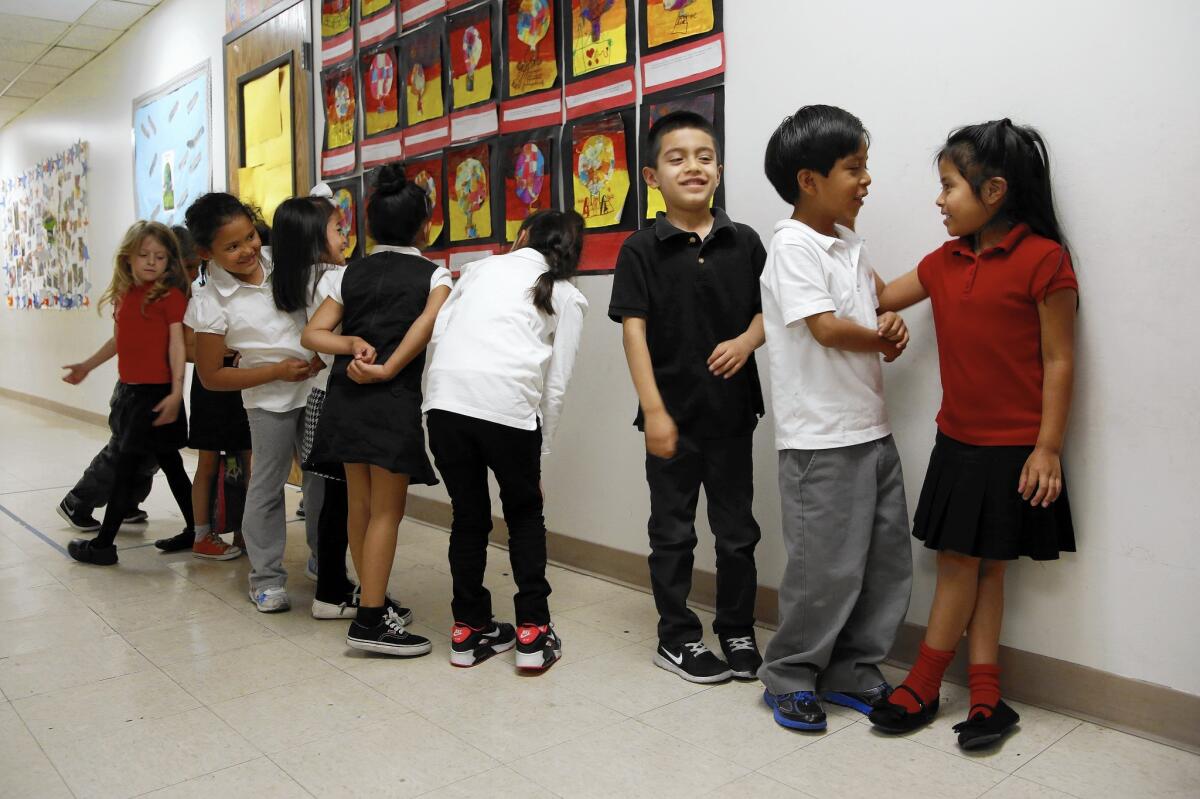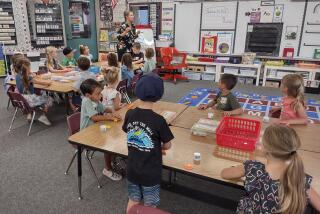It’s true: Kindergarten is optional in California

Reporting From Sacramento — Some kids who skip kindergarten have to play catch-up when they enter first grade: to learn how to hold a pencil, count to 100 and begin tackling spelling.
Educators and state lawmakers who want to close this achievement gap say it’s time to do away with optional kindergarten for California children. They are backing legislation to make it mandatory.
“Kindergarten is what first grade used to be,” said Telma Bayona, administrator for child development and preschool at Compton Unified School District.
Once intended as a soft entry into the school system, filled with finger painting and songs, kindergarten has become increasingly focused on academics, with more activity geared toward reading, writing and math concepts. Students without it can be lost once they reach the classroom, educators say.
Sixteen other states and the District of Columbia require kindergarten, according to data from the Education Commission of the States, a research group that tracks education policy.
State lawmakers have launched multiple versions of a kindergarten mandate over the years. Each was blocked by opponents who said it would cost too much and stifle parental choice.
Last year, Gov. Jerry Brown vetoed a proposal that passed the Legislature, saying he preferred “to let parents determine what is best for their children, rather than mandate an entirely new grade level.”
The California Teachers Assn., the powerful union that is co-sponsoring the current bill and has backed previous legislative efforts, said it won’t give up.
“We will be back, year in and year out, until we accomplish this fundamental building block that we feel is critical to students’ success,” Toni Trigueiro, a representative of the California Teachers Assn., said at a state Senate committee hearing last month.
The legislation passed the Assembly in June and is pending in the Senate.
The governor has not taken a public position on the bill, and officials have issued conflicting projections of its potential cost.
Brown’s Department of Finance, which issued a position paper against the measure, estimates that 80% to 86% of age-appropriate children — those who turn 5 by Sept. 1 of a school year — attend public kindergarten and that the cost of educating the remaining share would be $276 million to $620 million.
The state Department of Education, run by independently elected Superintendent of Public Instruction Tom Torlakson, estimates that about 93% of 5-year-olds attend public kindergarten in a given year, and that the cost of educating the remaining share would be some $307 million annually. Torlakson has not taken a public position on the proposal, according to his office.
Supporters of the measure said required kindergarten would lead to better academic outcomes for low-income students, who tend to participate in kindergarten at lower rates, and improve economic growth.
Early education is “essential to transforming a community like Compton, where there are tremendously high levels of poverty and unemployment,” said Micah Ali, president of the Compton Unified School District board.
Backers hope to win over the governor this year with the inclusion of some new flexibility for parents: Children could complete the kindergarten requirement through registered home schooling or at an accredited private or public school.
Like last year’s proposal, the measure also preserves California’s requirement that kids start school at age 6. Kindergarten traditionally starts at 5, but parents could wait and enroll children in kindergarten at 6. But skipping kindergarten – even for a more mature or academically advanced child who might otherwise go straight to first grade — would no longer be an option.
“The governor thinks parents can make good decisions about what their children need,” said Assemblywoman Shirley Weber (D-San Diego), author of the measure, AB 713. “Well, that argument can also be said about first and second grade.... Why does the state mandate that you go to school in first and second grade if parents always do what’s best?”
Opponents of her bill said the issue does, in fact, boil down to parental choice.
“Most folks are already making the decision to have their kids in kindergarten,” said Mike Smith, president of the Home School Legal Defense Assn., a Virginia-based group that provides legal assistance to parents who home-school their children.
“I don’t see any need to impose this on the rest of the people,” Smith said.
He said his faith in the governor was shaken slightly this summer when Brown signed a law ending religious and other personal-belief exemptions from vaccines for schoolchildren. The kindergarten mandate would be more government overreach, Smith said.
Ashley Novelozo said kindergarten helped her daughter, Olivia Novelozo, who started first grade this week at Beamer Park Elementary School in Woodland, near Sacramento. An only child, Olivia learned in kindergarten to socialize with peers and get used to be away from home, then happily reunited with her kindergarten friends this year, her mother said.
“I can’t even imagine a 6-year-old coming straight into first grade,” she said.
Barbara Rico’s daughter Hailey, 5, will start kindergarten at Larchmont Charter School this month — largely to ensure that she’ll be able to interact with others her age. But Rico would keep Hailey home if she were unhappy.
“It’s important ... so she could socialize with other kids,” Rico said. “I just want her to get a little more independent.”
Beth Graue, professor of curriculum and instruction at the University of Wisconsin, is a leading expert on kindergarten curricula. She worries that kindergarten, which she says should be developmentally appropriate and encourage children’s curiosity, is instead being used to help prop up student test scores as the state and federal governments put more emphasis on them.
“Children don’t get very much choice anymore in kindergarten,” Graue said. “Everything they do is directed by the teacher and the schedule.”
Wisconsin adopted a kindergarten requirement, but allowed for exemptions set by local school boards, in 2009.
Requiring kindergarten would not necessarily resolve the poor attendance issue, some experts said. But there are other ways to do that.
Cindy Marten, superintendent of the San Diego Unified School District, said some parents think kindergarten is not “real” school and keep children home for vacations, minor stomach aches and bad weather. In her district, teachers might call parents when a child is absent, and school-based health centers have been established, in an effort to keep kids coming.
About 180 students were missing school whenever it rained — compared to 15 or 20 on average — so staff members started handing out umbrellas.
Twitter: @kchirbas
Times staff writers Sonali Kohli and Joy Resmovits contributed to this report.
More to Read
Sign up for Essential California
The most important California stories and recommendations in your inbox every morning.
You may occasionally receive promotional content from the Los Angeles Times.










